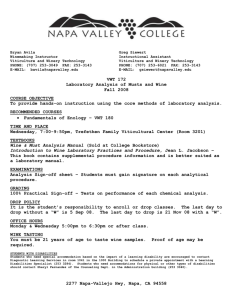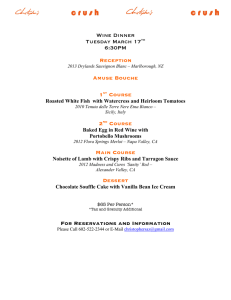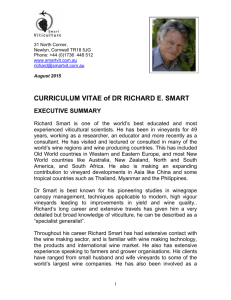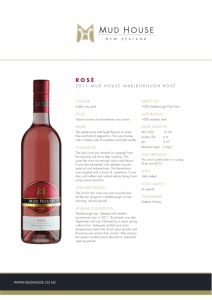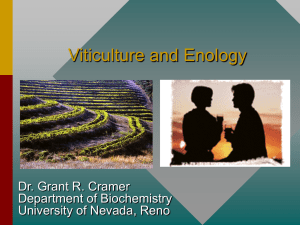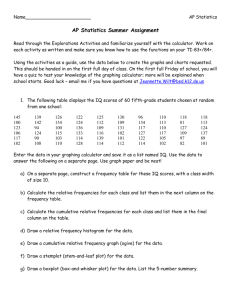(Hons) Viticulture and Oenology Programme
advertisement
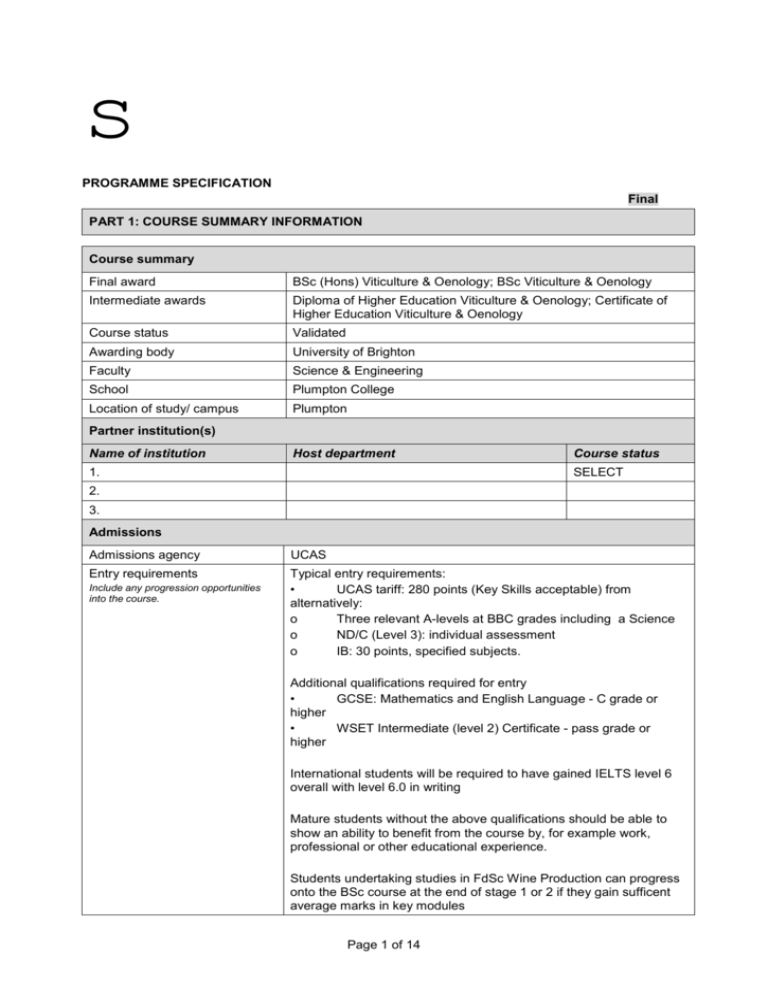
s PROGRAMME SPECIFICATION Final PART 1: COURSE SUMMARY INFORMATION Course summary Final award BSc (Hons) Viticulture & Oenology; BSc Viticulture & Oenology Intermediate awards Diploma of Higher Education Viticulture & Oenology; Certificate of Higher Education Viticulture & Oenology Course status Validated Awarding body University of Brighton Faculty Science & Engineering School Plumpton College Location of study/ campus Plumpton Partner institution(s) Name of institution Host department 1. Course status SELECT 2. 3. Admissions Admissions agency UCAS Entry requirements Typical entry requirements: • UCAS tariff: 280 points (Key Skills acceptable) from alternatively: o Three relevant A-levels at BBC grades including a Science o ND/C (Level 3): individual assessment o IB: 30 points, specified subjects. Include any progression opportunities into the course. Additional qualifications required for entry • GCSE: Mathematics and English Language - C grade or higher • WSET Intermediate (level 2) Certificate - pass grade or higher International students will be required to have gained IELTS level 6 overall with level 6.0 in writing Mature students without the above qualifications should be able to show an ability to benefit from the course by, for example work, professional or other educational experience. Students undertaking studies in FdSc Wine Production can progress onto the BSc course at the end of stage 1 or 2 if they gain sufficent average marks in key modules Page 1 of 14 Start date (mmm-yy) Sept 14 Normally September Mode of study Mode of study Duration of study (standard) Maximum registration period Full-time 3 years 5 years Part-time Other: 6 years 8 years Sandwich Select Select Distance Select Select Course codes/categories UCAS code D636 Contacts Course Leader (or Course Development Leader) Tony Milanowski Tony.milanowski@plumpton.ac.uk 01273 890454 ext 2269 Admissions Tutor The Admissions Team, Plumpton College 01273 892082 admissions@plumpton.ac.uk Examination and Assessment External Examiner(s) Name Place of work Date tenure expires Robert Falconer University of Sheffield Sep 2018 Alessandra Valsecchi Examination Board(s) (AEB/CEB) Sep 2015 Albury Vineyard Plumpton College Wine Area Examination Board Plumpton College Wine Course Examination Board Approval and review Approval date Review date Validation Sep 20051 Feb 20102 Programme Specification July 143 July 154 5 Professional, Statutory and Regulatory Body 1 (if applicable): Professional, Statutory and Regulatory Body 2 (if applicable): Professional, Statutory and Regulatory Body 3 (if applicable): 1 Date of original validation. Date of most recent periodic review (normally academic year of validation + 5 years). 3 Month and year this version of the programme specification was approved (normally September). 4 Date programme specification will be reviewed (normally approval date + 1 year). If programme specification is applicable to a particular cohort, please state here. 5 Date of most recent review by accrediting/ approving external body. 2 Page 2 of 14 PART 2: COURSE DETAILS AIMS AND LEARNING OUTCOMES Aims The aims of the course are: The overall aim of the BSc (Hons) Viticulture and Oenology is to develop the range of academic and transferable skills associated with an education in Viticulture and Oenology thus equipping graduates for either subject-related or wider employment opportunities in the wine industry. This is achieved by providing a broad foundation for wine studies and opportunities for subsequent specialisation, with students developing viticultural and oenological abilities and knowledge along with more general academic and scientific abilities as they progress through the course. The course develops, through the medium of viticultural and oenological study, a range of transferable skills including IT and quantitative skills, scientific skills, communication skills, group-work abilities and personal organisation and development. This is achieved through a combination of classroom, laboratory, winery, vineyard and project modules. A key feature of the degree course is the development of careers-related and life-long learning skills in partnership with the University's Careers Planning Agreement. The course further develops a range of viticultural and oenological and academic research skills The aims of each Level are as follows: Level 4 Provide students with a balanced programme of study spanning topics of wine production. Provide students with a sound understanding of core concepts in the vineyard and the winery. Introduce students to a range of viticultural and oenological skills including practical winery and vineyard skills, laboratory and IT, together with transferable skills including oral and written communication, teamwork, interpretation and analysis of qualitative and quantitative data, critical analysis and problem-solving Level 5 will additionally: Allow students to develop a deeper knowledge and understanding of viticulture and wine production. Introduce students to the critical evaluation and application of core concepts in new contexts in the vineyard, laboratory and winery. Provide students with an appreciation of the processes of knowledge generation within viticulture and oenology. Introduce students to the process of research design and implementation in small groups. Provide students with an opportunity to place their subject-specific and wider learning within the context of employment opportunities and career planning. Level 6 will: Provide students with an opportunity to place their subject-specific and wider learning within an industrial context. Allow students to develop a deeper knowledge and critical understanding of chosen aspects of viticulture and wine production Provide students with an opportunity to evaluate different approaches to solving problems in the complex interlinked biochemical systems found in vineyards and wineries Enable students to develop independence in their learning Require students to design, implement and communicate the results of an independent specialist research study on topic related to wine The progressive development of knowledge and understanding is an important feature of the Viticulture Page 3 of 14 and Oenology degree course: Stage 1 develops understanding of core Wine Production components together with basic Viticulture, with the emphasis on practical skills. Stage 2 develops wider and more critical knowledge of Viticulture and Wine Production through the practical winery skills, and other concepts in Wine Science as well as the principles of the research process and its application. Stage 3 develops deeper understanding and application of oenological and viticultural knowledge through individual research projects and modules such as Oenology and Sustainable Wine Production. The course offers the student the ability to develop a specialized understanding of wine production issues beyond the compulsory modules taken at Levels 4 to 6, through selection from a wide range of optional modules (see Section 4 - Course Structure). Learning outcomes The outcomes of the main award provide information about how the primary aims are demonstrated by students following the course. These are mapped to external reference points where appropriate 6. Knowledge and theory Skills Includes intellectual skills (i.e. generic skills relating to academic study, problem solving, evaluation, research etc.) and professional/ practical skills. 6 1. Detailed understanding of the science underlying Viticulture & Oenology, such as Chemistry and Biology, and its relationship to the wine production process. 2. The underlying principles of Viticulture & Oenology, its relevant defining concepts, theories and methods, and an ability to apply these in a commercial context. 3. The current knowledge of and recent developments in Viticulture & Oenology together with an appreciation of the current gaps and the provisional nature of information. 4. Aspects of the defining elements of Viticulture & Oenology as a result of in-depth study. 5. The operation and use of tools and techniques for research, data acquisition, analysis and interpretation. Skills: Throughout the degree course, the following intellectual, discipline-specific and transferable skills are developed: 6. Intellectual skills: o The ability to develop a reasoned and critical argument through the integration and interpretation of primary and secondary materials o An ability to generate viticultural and oenological research questions and to identify and use appropriate methods in reaching and reporting conclusions o An understanding of the basic theoretical, philosophical and methodological issues relating to qualitative and quantitative research in viticulture and oenology. o The ability to critically evaluate evidence, ideas and theoretical standpoints within viticultural and oenological contexts with a range of specialized equipment o The ability to undertake a deeper approach to learning and understanding wine production issues o An understanding of the constructed and dynamic nature of all knowledge 7. Discipline-specific skills: o The ability to collect, interpret and synthesise different types of viticultural and oenological data. o The ability to prepare quality control plans and winery designs using appropriate approaches and technologies o The ability to work safely and effectively in laboratory, winery and Please refer to Course Development and Review Handbook or QAA website for details. Page 4 of 14 vineyard contexts. An understanding of the processes of knowledge generation in the various disciplines in wine studies. o The ability to identify a viticultural and oenological problem or issue, to investigate it through an appropriately planned, designed and implemented research project, and to present the findings as a project report using reasoned argument to draw clear conclusions. 8. Transferable skills: o The ability to communicate ideas and arguments about theoretical and practical aspects of wine production effectively in writing, verbally, and graphically. o The ability to collect, record, analyse and present data of various forms using appropriate analytical techniques. o The ability to learn and study independently, to take responsibility for the management of independent investigation and learning, and to plan time effectively. o The ability to work and communicate effectively as part of a team. o Competences in the use of appropriate IT packages to find, explore, develop and present numbers, text and images. o The ability to use appropriate techniques for job-seeking and information acquisition for life-long learning. o An appreciation of the broader environmental and academic contexts of their learning o These outcomes have been informed by both the QAA Framework for Higher Education Qualifications and the QAA Qualification Benchmark for Degrees. QAA subject benchmark statement (where applicable)7 Agriculture, forestry, agricultural sciences, food sciences and consumer sciences PROFESSIONAL, STATUTORY AND REGULATORY BODIES (where applicable) Where a course is accredited by a PSRB, full details of how the course meets external requirements, and what students are required to undertake, are included. NA LEARNING AND TEACHING Learning and teaching methods This section sets out the primary learning and teaching methods, including total learning hours and any specific requirements in terms of practical/ clinical-based learning. The indicative list of learning and teaching methods includes information on the proportion of the course delivered by each method and details where a particular method relates to a particular element of the course. Students take modules totalling 120 credits per year; each module is designed to comprise 100 hours total learning time and is typically studied over a 15-week semester. A typical 10-credit module will usually comprise of a combination of tutor-led contact sessions (normally 2 - 3 hours per week) and guided independent study (including time spent in preparing and completing assessment tasks). Students engage in a range of learning activities: 7 Please refer to the QAA website for details. Page 5 of 14 Compulsory Modules Learning and Teaching Method Lectures, tutorials, practicals Independent study Indicative % of student effort Normally 30% Normally 70% The learning and teaching strategy at stage 1 is designed to facilitate student learning in their new undergraduate academic environment such that a range of small-group opportunities including tutored tastings, practical and fieldwork (together accommodating approximately 65% of contact time) are used in conjunction with lectures (35% of core contact at this level). Practical laboratories and winery work provide opportunities for guided investigations at stage 2 within small groups and real work environments (40% core activity at this level). Generally, learning and teaching methods at stage 2 are designed to provide a sound knowledge of key concepts through lecture activity (40% core activity at this level), however to encourage greater analysis and application of lecture material a significant proportion of student effort is given over to student led seminars, and reflective participation in workshops (20% of core contact at this level). Learning and teaching opportunities based on student-centered learning increase further with progression to stage 3 of the course, highlighted in the core 30-credit, Project 3 module. This is a substantially independent research project negotiated, designed and completed in collaboration with an individual tutor. The remaining student effort is split evenly between lectures (50% of core activity at this level) and seminars, practicals and workshops (50% of core activity at this level). Finally with the optional modules available at stage 2 and 3 there are opportunities for students to undertake learning from a diverse range of teaching styles on the modules including further opportunities to participate in lectures, workshops & seminars, tutored tasting, practicals and case studies. Learning support is given through a dedicated module focusing on academic skills, for example, writing assignments, using the Harvard referencing system, and avoiding plagiarism. These tutorials are supported by further individual tutorials as well as the provision of electronic resources through Plumpton Online including the College study skills resource. e-Learning All modules on the course have presence on Plumpton Online providing key student information including module descriptors, assessment briefs, teaching schedules, staff profiles and communication via messages and forums. Besides this base-line provision several modules and sections on Plumpton Online have additional e-learning enhancement. This includes formative & summative on-line assessment for PW 119 Introductory skills in wine science, PL107 Chemistry, PW115 Grape processing & Fermentation On-line assessment tools are also used to provide pre-practical briefings for wine analysis modules (PW106 & PW209) and ensure students have improved productivity during their practicals. Finally Plumpton Online is used to host asynchronous video and audio content of lectures, assessments, mock exams, session plans to engage students and enhance student planning and revision. Work related learning The key element of work related learning is the stage 3, PW306 Vintage winemaking placement. This module provides a significant (160hrs) and contemporary industrial context to the knowledge and skills learnt in Stages 1 & 2. Student experiences during this placement are also used to contextualise later learning particular in the student-led seminars. Page 6 of 14 Besides the PW306 Vintage winemaking placement module, much of the practical tasks undertaken in Stage 1 & 2 are directly representative of the tasks undertaken in the wine industry. Students learn and work in the vineyard, winery, laboratory and tasting room, and the skills are transferable to a vocational setting. Research-informed teaching This course is principally delivered by staff active in their own fields of research, and specialist aspects of the curriculum (such as Wine Sensory Evaluation) reflect their fields of interest. This is particularly true for the final year project 3 module, where students spend an extended amount of time undertaking research with a member of staff or a research associate. Throughout the course, staff support and actively encourage students to develop skills of enquiry through tutorials and the research nature of module assessments (for example Vinification trials, mini-projects in Grape Berry Development, and sensory evaluation studies in Wine Sensory Evaluation 3 and project planning in Research Methods 2). Teaching and learning strategies are also influenced by current pedagogic research, particularly through staff training in University of Brighton PGCE (HE) and attendance at Centre for Learning and Teaching courses, seminars and conferences. Wine research at Plumpton College has been strengthened through provision of research winery and expansion of collaborative links to local & international industry (ie FAST, Exosect, CHR Hansen, IOC etc) as well as local & international education institutions (ie University of Reims, Geisenheim, University of Nottingham etc). Plumpton college will be hosting visiting academics and graduate and post graduate students from China, Spain, Germany, Czech Republic, Sweden and France. Education for sustainable development The Plumpton College and University of Brighton is committed to the principles of sustainable development and global citizenship. The Wine Department applies these principles through joint research with the UK Wine Industry and in integrating them throughout the delivery of its courses. These cover the development of an agricultural product, so sustainability issues are fundamentally important due to the direct interaction between the vineyard and its environment. For example, vineyard maintenance & establishment and the vine pathology modules must direct students towards a consideration of the environment in which they operate and encourage them to preserve it. Energy, water and waste management are also key issues in winery management, so there is considerable emphasis on these areas when discussing winemaking. The final year students are contributing to a sustainability scheme with the UK wine industry in the Sustainable Wine Production module ASSESSMENT Assessment methods This section sets out the summative assessment methods on the course and includes details on where to find further information on the criteria used in assessing coursework. It also provides an assessment matrix which reflects the variety of modes of assessment, and the volume of assessment in the course. The assessment procedures will comply with the University's General Examination & Assessment Regulations (GEAR). Diagnostic, formative and summative assessments are regarded as positive learning tools and assessment strategies will be designed to support the students’ understanding and foster a deep approach to learning. Assessment strategies will vary between modules and will be mapped against module outcomes. A variety of forms of assessment are used across the three levels of the degree course to demonstrate ability in a range of skills: Page 7 of 14 Learning outcome 1. Detailed understanding of the science underlying Viticulture & Oenology, such as Chemistry and Biology, and its relationship to the wine production process. 2. The underlying principles of Viticulture & Oenology, its relevant defining concepts, theories and methods, and an ability to apply these in a commercial context. Indicative assessment methods Module code Credits Examinations & tests Lab practicals PL107 PW118 PW303 10 20 10 Written reports Examinations & tests PW114 PW214 PW300 PW218 PW115 PW304 PW303 PW300 PW316 PW317 20 10 20 20 10 20 10 20 10 10 3. The current knowledge of and recent developments in Viticulture & Oenology together with an appreciation of the current gaps and the provisional nature of information. Laboratory reports Student led Seminar & workshops 4. Aspects of the defining elements of Viticulture & Oenology as a result of in-depth study. 5. The operation and use of tools and techniques for research, data acquisition, analysis and interpretation. Project report Resource development PL350 30 Projects and trials including planning & analysis PL350 PL215 PL203 PW218 PW318 PW217 PW304 PW214 PW217 PL215 PL350 PL203 PW300 PW319 PW220 PW217 PW110 PW106 PW209 PW317 PW303 PW306 PW115 PW217 PW218 PW304 PW100 PW108 PW205 PW209 PW222 PW312 PW316 PW223 30 10 10 20 10 10 20 10 10 10 30 10 20 10 10 20 20 10 10 10 10 10 10 10 10 20 10 10 20 10 10 10 10 10 Written reports Posters 6. Competence in intellectual skills Written reports Examinations Projects and trials including planning & analysis 7. Competence in discipline-specific skills Management plans & case studies Practical skills assessments Laboratory reports Vintage winemaking placement seminar Project & trials 8. Competence in transferable skills Practical tasting skills assessment Student led seminar & workshop Business plans Page 8 of 14 SUPPORT AND INFORMATION Institutional/ University All students benefit from: Plumpton College induction week course (includes orientation and introduction to study and library skills) Student Handbook (including general advice to students on regulations, University policies, and advice and support facilities) Plumpton College study skills resources Library facilities at Plumpton College including access to electronic journals and ebooks Open access computer rooms at Plumpton College (Resources Centre and Wine Science Centre) Wireless access in selected areas of the Plumpton College campus Plumpton College Virtual Learning Environment (Plumpton Online) with general student information Students have student email and internet access Student services, including Welfare, Careers, Counselling, Financial, Accommodation, Sexual Health and Chaplaincy support Single personal tutor for duration of the course Course-specific In addition, students on this course benefit from: Please refer to information held on Plumpton Online a) Handbooks and Guidance Notes BSc (Hons) Viticulture & Oenology Course Handbook PL350 Project 3 Handbook PW306 Vintage Winemaking Placement handbook Additional support, specifically where courses have nontraditional patterns of delivery (e.g. distance learning and work-based learning) include: b) Academic and Administrative Support Single personal tutor who monitors academic and personal progress of students on the course Plumpton Online with extensive resources on module basis as well as course basis Plumpton College computing support staff Wine career guidance and support sessions c) Laboratory Facilities Plumpton College teaching laboratory and research laboratory, equipped with analytical facilities such as HPLC and spectrophotometry Plumpton College research winery with facilities for small-scale wine production Dedicated wine tasting and sensory evaluation room d) Wine production facilities 7 hectares of vineyard A full range of vinegrowing and winemaking equipment in a wellequipped winery Winery laboratories e) Other Regular study tours conducted to Bordeaux, Montpellier, Burgundy and Champagne EU/DEFRA funded WineSkills initiative for students employed in the local industry Significant support of alumni and wine industry in the provision of work experience Page 9 of 14 PART 3: COURSE SPECIFIC REGULATIONS COURSE STRUCTURE This section includes an outline of the structure of the programme, including stages of study and progression points. Course Leaders may choose to include a structure diagram here. The full time course is studied over 3 years, with the academic year divided into two semesters. An optional placement year may be undertaken between stage 2 and 3 (Years 2 and 3 for full time study). Study is undertaken at Levels 4, 5 and 6 of the national qualifications framework, and is divided into modules. The standard value of a single module is 10 credits (equivalent to 100 hours learning) and the structure allows the use of multiples of this (for example the Level 3 project module is awarded 30 credits = 300 hours). Full-time students study for 120 credits (12 modules) each year, beginning at stage 1 and progressing through stage 2 and 3. A student should obtain 120 credits at each stage before progressing to the next. Stage 1 of the course focuses on vinegrowing and modules providing underpinning knowledge and theory such as chemistry, botany, soil and the environment. Winemaking concepts are introduced in stage 1, but these are further developed in stage 2. Stage 2 contains extensive applied and practical winemaking as well as applied viticulture that builds on stage one. Stage 2 also has modules on research methodology and statistics which provide a solid foundation for stage 3 studies. Several optional modules are available at stage 2 to allow students to tailor their learning. Stage 3 contains in-depth theoretical modules in viticulture, oenology, microbiology, as well as optional modules sustainability, sparkling wine production and viticulture management. The vintage winemaking placement module undertaken at the start of stage 3 requires students to complete an extensive work placement in a commercial winery, which provides a vocational overview of their studies. Placements are organised by students but are supported by tutors, alumni and significant database of work placement providers. Finally stage 3 contains a 30-credit project, where the student displays the ability to study independently an area of particular interest within wine production. Each stage of study contains a wine analysis and a sensory evaluation module, with progressive levels of academic development Work-related learning is incorporated into the course through extensive practical activity in the College vineyard, winery and laboratory, and through the vintage winemaking placement module. The QAA Subject Benchmark Statement has informed both the course content and curriculum. The course structure is further supplemented by the developments and suggestion arising for the curriculum advisory panel, course boards and staff reviews. Page 10 of 14 Year Sem Viticulture & vines 1 1 PW114 Vineyard Establishment & Maintenance Oenology & wines Wine Tasting & Evaluation Science & Lab Analysis Other PW100 Wines & Spirits of the World PL107 Chemistry PW119 Introductory skills in Wine Science PW108 Wine Sensory Evaluation 1 PW118 Grapevine Biology 1 PW110 Vineyard practical skills 2 PW114 Vineyard Establishment & Maintenance PW115 Grape Processing & Fermentation PW106 Wine Analysis 1 PW110 Vineyard Practical Skills 2 1 2 3 1 PW214 * Vine Protection PW220 * Managing Vineyard Operations PW319 * Vineyard Management PW304 Grape Berry composition & development 2 PW304 Grape Berry composition & development PW118 Grapevine Biology 1 Project PW216 Winery Engineering & Practical Skills PW222 * Sparkling & Fortified PW218 Vinification PW205* Wines of the World PW216 Winery Engineering & Practical Skills PW205 * Wines of the World PW218 Vinification PW215 * Wine Sensory Evaluation 2 PW306 Vintage winemaking placement PW209 * Wine Analysis 2 PL203 Statistics PL206 * Work Placement 2 PW217 Grapevine Biology 2 PW204 * Contemporary Issues in Alcohol PL215 Research Methods 2 PL204 * Project 2 PL204 * Project 2 PW223 Wine Business Planning 2 PW317 * Wine Analysis 3 PL350 Project 3 PW300 Oenology PW300 Oenology PW318 * Wine Sensory Evaluation 3 PW303 Wine Microbiology PW312 * Sustainable Wine Production PW316 * Sparkling Wine * Indicates optional modules Modules Status: C = Compulsory (modules which must be taken to be eligible for the award) O = Optional (optional modules) Page 11 of 14 PL350 Project 3 Level8 Module code Status Module title Sem Credit Stage 1 4 PW110 C Vineyard Practical Skills Year 20 4 PW114 C Vineyard Establishment & Maintenance Year 20 4 PW118 C Grapevine Biology 1 Year 20 4 PL107 C Chemistry 1 10 4 PW100 C Wines and spirits of the world 1 10 4 PW119 C Introductory skills in Wine Science 1 10 4 PW106 C Wine Analysis 1 2 10 4 PW108 C Wine Sensory Evaluation 1 2 10 4 PW115 C Grape Processing and Fermentation 2 10 Stage 2 5 PW216 C Winery Engineering & Practical Skills Year 20 5 PW218 C Vinification Year 20 5 PL203 C Statistics 1 10 5 PL215 C Research Methods 2 1 10 5 PW217 C Grapevine Biology 2 2 10 5 PW223 C Wine Business Planning 2 2 10 5 PL204 O Project 2 Year 20 5 PL205 O Career Development Year 10 5 PL206 O Work Placement 2 Year 10 5 PW205 O Wines of the World Year 20 5 PW209 O Wine Analysis 2 1 10 5 PW214 O Vine Protection 1 10 5 PW222 O Sparkling and Fortified Wine 1 10 5 PW204 O Contemporary Issues in Alcohol 2 10 5 PW215 O Wine Sensory Evaluation 2 2 10 5 PW220 O Managing Vineyard Operations 2 10 Stage 3 6 PL350 C Project 3 Year 30 6 PW300 C Oenology Year 20 6 PW304 C Grape Berry Composition & Development Year 20 6 PW306 C Vintage Winemaking Placement 1 10 6 PW303 C Wine Microbiology 2 10 6 PW317 O Wine Analysis 3 1 10 6 PW319 O Vineyard Management 1 10 6 PW312 O Sustainable Wine Production 2 10 6 PW316 O Sparkling Wine 2 10 6 PW318 O Wine Sensory Evaluation 3 2 10 8 All modules have learning outcomes commensurate with the FHEQ levels 0, 4, 5, 6, 7 and 8. List the level which corresponds with the learning outcomes of each module. Page 12 of 14 AWARD AND CLASSIFICATION Award type Final Award* Title Level Eligibility for award Classification of award Total credits9 Minimum credits10 Ratio of marks11: Class of award BSc (Hons) Viticulture & Oenology 6 Total credit 360 Minimum credit at level of award 90 Levels 5 and 6 (25:75) Honours degree Intermediate Dip HE Viticulture & Oenology 5 Total credit 240 Minimum credit at level of award 90 Level 5 marks Not applicable Intermediate Cert Viticulture & Oenology 4 Total credit 120 Minimum credit at level of award 90 Level 4 marks Not applicable Final Viticulture & Oenology 6 Total credit 300 Minimum credit at level of award 60 Levels 5 and 6 (25:75) Ordinary degree Select Total credit Select Minimum credit at level of award Select Select Select BSc Select *Foundation degrees only Progression routes from award: Award classifications Mark/ band % Foundation degree Honours degree Postgraduate12 degree (excludes PGCE and BM BS) 70% - 100% Distinction First (1) Distinction 60% - 69.99% Me Upper second (2:1) Merit Lower second (2:2) Pass 50% - 59.99% 40% - 49.99% Pass t Third (3) 9 Total number of credits required to be eligible for the award. Minimum number of credits required, at level of award, to be eligible for the award. 11 Algorithm used to determine the classification of the final award (all marks are credit-weighted). For a Masters degree, the mark for the final element (e.g, dissertation) must be in the corresponding class of award. 12 Refers to taught provision: PG Cert, PG Dip, Masters. 10 Page 13 of 14 EXAMINATION AND ASSESSMENT REGULATIONS Please refer to the Course Approval and Review Handbook when completing this section. The examination and assessment regulations for the course should be in accordance with the University’s General Examination and Assessment Regulations for Taught Courses (available from staffcentral or studentcentral). Specific regulations which materially affect assessment, progression and award on the course Students must be over 18 years of age to attend this course. e.g. Where referrals or repeat of modules are not permitted in line with the University’s General Examination and Assessment Regulations for Taught Courses. Exceptions required by PSRB These require the approval of the Chair of the Academic Board Document template revised: 2010 Page 14 of 14
